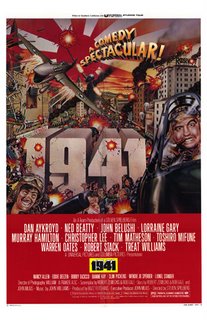
I've always avoided seeing 1941. Countless times, I've held it in my hand at the video store for a few moments before returning it to the shelf. I was afraid that it'd be the disaster it's generally known as, and that I'd have to reevaluate my opinion of the Spielberg oeuvre. I feared the indignity of having to sell my Jaws poster and stuffed E.T. doll on eBay. Most of all, I was afraid that I'd have to choose a new uncool mainstream auteur to defend on a regular basis. I've spent most of my life defining myself by my tastes, and it's a bit late to change course in such a drastic fashion; besides, Sydney Pollack doesn't return my calls. So last night, I finally decided to bite the bullet and watch Spielberg's much-maligned WWII comedy. Is it terrible? No. Good? Well...
The plot of 1941 revolves around post-Pearl Harbor fears that the Japanese would stage a large-scale attack on California (this element of the film is based in fact). As the film begins, a Japanese sub heads towards its planned target - Hollywood. At first, the film follows Wally (Bobby di Cicco), a young Zoot Suiter who tries to win the affections of Betty (Dianne Kay) at a jitterbug contest. However, any pretense of a coherent narrative thread is quickly abandoned in favor of over two hours of huge-scale slapstick and sophomoric sex jokes. The film's budget ballooned to $35 million (an enormous sum at the time) and required almost a year to shoot; Spielberg's budgets and schedueles have subsequently become tighter, and after seeing 1941, it's clear why.
1941 isn't a total failure. John Belushi is great as Wild Bill Kelso, a crazed pilot that is reminiscent of but subtly different from Bluto Blutarsky. Belushi was brilliant at playing stupid - the scene where he guzzles Coca-Cola over the Grand Canyon is a gem, and when Col. Maddox (Warren Oates) asks to hear his plane's guns, we catch a sociopathic twinkle in his eye. Spielberg works in fun parodies of Duel and Jaws; they could have been awkward, but they're effectively self-deprecating and irreverent. Robert Stack, as real-life General Joseph Stillwell, has a great, straight-faced scene while watching Dumbo. The aerial effects are very impressive, easily the equal of the dogfights in Star Wars in terms of believability. And, if nothing else, 1941 is worth seeing for the cast; I've frequently seen Christopher Lee and Toshiro Mifune torturing Slim Pickens in my dreams, but never in a motion picture.
The biggest problem with 1941 is a sense of overkill. Spielberg appears to have gone for the densely packed, MAD magazine style of humor, and later films like Airplane and The Blues Brothers (both released the year after 1941) would succeed at this. But 1941 is such a loud, frenzied amusement park ride that we're not offered an opportunity to stop and enjoy the sights. Much of the famous cast isn't given the opportunity to make any real impression (according to the credits, Mickey Rourke was in this, but damned if I know where). The bawdy material is just embarrassing. While flying an airplane, Tim Matheson informs Nancy Allen that they'll reach their target "just as soon as I make it through these... (stares at her breasts) ...hills." Ho, ho. The chaos works contrary to the comedy; the end credits feature the leads' reactions to various explosions, and I found it odd that a slapstick farce would end with screams rather than guffaws.
I'd like to say that this is simply a demonstration of Steven Spielberg's worst instincts as a director, but 1941 doesn't feel like a film directed by Spielberg (or by anyone, for that matter). Moments like the "knock, knock" joke in Catch Me If You Can and the coathanger gag in Raiders of the Lost Ark (originally filmed and then deleted from 1941) demonstrate that he is capable of directing comedy, but the masterful timing that is one of his best strengths is completely absent here. A late scene where Ward Douglas (Ned Beatty) destroys most of his home with an anti-aircraft gun should have been a highlight, but everything is too telegraphed, too obvious, and too loud. Most of Spielberg's films leave me elated; this one left me with a bit of a headache.
In one scene near the end, a ferris wheel is blasted loose from its foundation and rolls frantically down a pier, its occupants in a state of panic. It's a great comic setpiece, worthy of mention alongside Slim Pickens riding the bomb in Dr. Strangelove and the flying car in The Blues Brothers, and it almost makes the film worthwile. If the rest of the movie hadn't been so labored, then it could have been filled with wonderfully anarchic moments like this. Instead, it's hit-and-miss. It isn't Spielberg's worst movie - that honor belongs to the "Kick the Can" segment of Twilight Zone: The Movie - but it is his most baffling.
I think I'll hang onto E.T. for now, though.
No comments:
Post a Comment